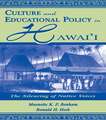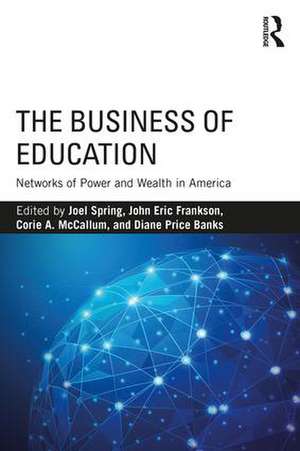The Business of Education: Networks of Power and Wealth in America: Sociocultural, Political, and Historical Studies in Education
Editat de Joel Spring, John Eric Frankson, Corie A. McCallum, Diane Price Banksen Limba Engleză Paperback – 21 iun 2017
| Toate formatele și edițiile | Preț | Express |
|---|---|---|
| Paperback (1) | 360.30 lei 6-8 săpt. | |
| Taylor & Francis – 21 iun 2017 | 360.30 lei 6-8 săpt. | |
| Hardback (1) | 1106.02 lei 6-8 săpt. | |
| Taylor & Francis – 22 iun 2017 | 1106.02 lei 6-8 săpt. |
Din seria Sociocultural, Political, and Historical Studies in Education
-
 Preț: 268.53 lei
Preț: 268.53 lei -
 Preț: 370.47 lei
Preț: 370.47 lei - 8%
 Preț: 376.19 lei
Preț: 376.19 lei -
 Preț: 347.43 lei
Preț: 347.43 lei -
 Preț: 453.89 lei
Preț: 453.89 lei -
 Preț: 447.14 lei
Preț: 447.14 lei -
 Preț: 431.95 lei
Preț: 431.95 lei - 18%
 Preț: 1001.90 lei
Preț: 1001.90 lei -
 Preț: 455.84 lei
Preț: 455.84 lei -
 Preț: 303.63 lei
Preț: 303.63 lei -
 Preț: 484.04 lei
Preț: 484.04 lei -
 Preț: 452.91 lei
Preț: 452.91 lei -
 Preț: 477.56 lei
Preț: 477.56 lei -
 Preț: 392.50 lei
Preț: 392.50 lei - 18%
 Preț: 1000.27 lei
Preț: 1000.27 lei - 15%
 Preț: 682.21 lei
Preț: 682.21 lei -
 Preț: 395.93 lei
Preț: 395.93 lei -
 Preț: 470.43 lei
Preț: 470.43 lei -
 Preț: 395.63 lei
Preț: 395.63 lei -
 Preț: 437.71 lei
Preț: 437.71 lei -
 Preț: 448.12 lei
Preț: 448.12 lei - 18%
 Preț: 1111.58 lei
Preț: 1111.58 lei - 18%
 Preț: 954.50 lei
Preț: 954.50 lei -
 Preț: 476.60 lei
Preț: 476.60 lei - 18%
 Preț: 1000.27 lei
Preț: 1000.27 lei - 26%
 Preț: 258.30 lei
Preț: 258.30 lei - 18%
 Preț: 999.98 lei
Preț: 999.98 lei - 18%
 Preț: 1057.75 lei
Preț: 1057.75 lei -
 Preț: 304.73 lei
Preț: 304.73 lei - 25%
 Preț: 260.73 lei
Preț: 260.73 lei - 26%
 Preț: 872.70 lei
Preț: 872.70 lei - 18%
 Preț: 1109.99 lei
Preț: 1109.99 lei -
 Preț: 383.75 lei
Preț: 383.75 lei -
 Preț: 387.49 lei
Preț: 387.49 lei -
 Preț: 403.65 lei
Preț: 403.65 lei - 15%
 Preț: 565.78 lei
Preț: 565.78 lei
Preț: 360.30 lei
Nou
Puncte Express: 540
Preț estimativ în valută:
68.94€ • 72.18$ • 57.05£
68.94€ • 72.18$ • 57.05£
Carte tipărită la comandă
Livrare economică 05-19 aprilie
Preluare comenzi: 021 569.72.76
Specificații
ISBN-13: 9781138206274
ISBN-10: 113820627X
Pagini: 176
Ilustrații: 7
Dimensiuni: 152 x 229 x 17 mm
Greutate: 0.55 kg
Ediția:1
Editura: Taylor & Francis
Colecția Routledge
Seria Sociocultural, Political, and Historical Studies in Education
Locul publicării:Oxford, United Kingdom
ISBN-10: 113820627X
Pagini: 176
Ilustrații: 7
Dimensiuni: 152 x 229 x 17 mm
Greutate: 0.55 kg
Ediția:1
Editura: Taylor & Francis
Colecția Routledge
Seria Sociocultural, Political, and Historical Studies in Education
Locul publicării:Oxford, United Kingdom
Public țintă
Postgraduate and UndergraduateCuprins
Preface
Chapter 1 The New Politics of American Education
Joel Spring
Chapter 2 Admitting Privilege
John Eric Frankson
Chapter 3 AVID About College: A Look into AVID’s Governing Structure
Robert P. Robinson
Chapter 4 A Not So Individualized Education Plan: Examining NYC DOE Contract with MAXIMUS That Brought us SESIS
Amy Goods
Chapter 5 Turning Against (Public) Arts Education: An Arts Perspective of the Business of Education
Robert Randazzo
Chapter 6 Policy Networks and Political Decisions Influencing the Dream Act: The Power of the Dreamers
Aminata Diop
Chapter 7 The Call for Faculty Preparation
Diane Price Banks
Chapter 8 Exploring Federal Financial Aid Networks – Who Cares and Why?
Corie McCallum
Chapter 9 A Political Economy of Incarceration: Race, Schooling and the Criminal Justice System
Sakina Laksimi-Morrow
Chapter 10 A Shared Path to Success: The Promise and Challenge of Special Education in New York City
Melanie Waller
List of Contributors
Index
Chapter 1 The New Politics of American Education
Joel Spring
Chapter 2 Admitting Privilege
John Eric Frankson
Chapter 3 AVID About College: A Look into AVID’s Governing Structure
Robert P. Robinson
Chapter 4 A Not So Individualized Education Plan: Examining NYC DOE Contract with MAXIMUS That Brought us SESIS
Amy Goods
Chapter 5 Turning Against (Public) Arts Education: An Arts Perspective of the Business of Education
Robert Randazzo
Chapter 6 Policy Networks and Political Decisions Influencing the Dream Act: The Power of the Dreamers
Aminata Diop
Chapter 7 The Call for Faculty Preparation
Diane Price Banks
Chapter 8 Exploring Federal Financial Aid Networks – Who Cares and Why?
Corie McCallum
Chapter 9 A Political Economy of Incarceration: Race, Schooling and the Criminal Justice System
Sakina Laksimi-Morrow
Chapter 10 A Shared Path to Success: The Promise and Challenge of Special Education in New York City
Melanie Waller
List of Contributors
Index
Notă biografică
Joel Spring is Professor at Queens College/City University of New York and the Graduate Center of the City University of New York, USA.
John Eric Frankson is Assistant Program Officer in the Office of Educational Opportunity and Diversity at the Graduate Center of the City University of New York, USA.
Corie A. McCallum is Student Life Specialist/Student Conduct Advisor at New York City College of Technology/City University of New York, USA.
Diane Price Banks is an Instructor in the Biological Sciences Department at Bronx Community College/City University of New York, USA.
John Eric Frankson is Assistant Program Officer in the Office of Educational Opportunity and Diversity at the Graduate Center of the City University of New York, USA.
Corie A. McCallum is Student Life Specialist/Student Conduct Advisor at New York City College of Technology/City University of New York, USA.
Diane Price Banks is an Instructor in the Biological Sciences Department at Bronx Community College/City University of New York, USA.
Descriere
The Business of Education—a comprehensive view of how education policy is made in the US and, in some cases, globally—analyzes and critiques the influence of educational policy networks in a wide range of contexts and from a variety of perspectives, including testing, college preparation, juvenile detention centers, special education, the arts, teacher evaluation systems, education of undocumented immigrants, college faculty preparation, and financial aid. A network chart in most chapters illustrates how the major political actors, mainly private philanthropic foundations, for-profit companies, government officials, and politicians involved in the network, are linked. Joel Spring, internationally renowned scholar and analyst of educational policy, situates and frames the network studies in an introduction discussing general theories of education policy networks.
